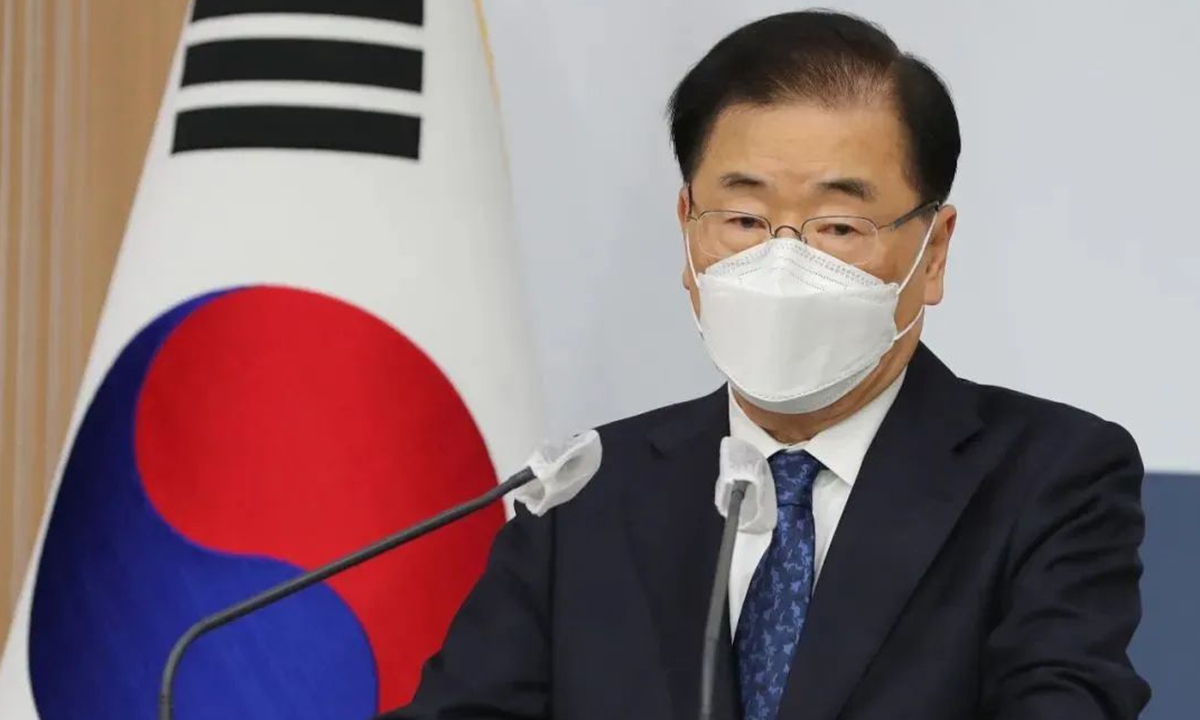South Korean FM is pro-SK interest rather than 'pro-China': Global Times editorial

Chung Eui-yong Photo:VCG
When South Korean Foreign Minister Chung Eui-yong tried to explain his controversial "pro-China" remarks, he might have once again accidentally spelt out the truth. On Thursday, he said, although some countries are concerned over China becoming more assertive, he does not believe China is treating South Korea this way.
A day earlier, Chung, who accompanied South Korean President Moon Jae-in on a visit to the US, expressed different views when asked by CNN: "Do you sense in the last few years that China is becoming more assertive?" He said, "China has become an economic superpower, and China today is not the same as China 20 years ago. It is natural for China to capitalize on its presence to gain a competitive edge in diplomacy." Chung said that South Korea does not feel an urgent need to join the Quad. When asked "do you believe countries have to choose between America and China, countries in Asia?" He answered, he does not think so, adding that's not a choice South Korea "will be forced to make."
In the US-dominated Western public opinion sphere, Chung's words seem quite "politically incorrect." Some South Korean media outlets, deeply influenced by the US, expressed their surprise. A former South Korean lawmaker even asked Chung: which country's foreign minister are you? The question was later widely quoted.
Chung was just telling the truth. Has South Korea's economic policy been coerced by China? Isn't China-South Korea economic cooperation highly equal and mutually beneficial? As a close neighbor and a crucial trading partner of China, has South Korea benefited from ties with China or been faced with tremendous pressure? The answers are obvious.
In its relations with China, South Korean society has fully maintained the pride of both its country and nationality. Its independence has not at all been disturbed by China. If there is any country that has "assertively" influenced South Korea's diplomacy, it is apparently the US, not China.China is the largest trading partner of almost all its neighboring countries, not just South Korea. Which of them tend to feel the "assertiveness" more than other feelings when interacting with China? Can Washington name an example and elaborate the way China coerces others? India coerced Bhutan and publicly deprived part of the sovereignty of that small country in the foothills of the Himalayas as a protectorate. The US has obviously been and is coercing Myanmar. How can they possibly be so shameless to pin the label of "assertive diplomacy" on China?
Which country is not "assertive" when safeguarding its own sovereignty? There are territorial disputes between China and a number of countries. China has been clearly voicing its stance, firmly defending its interests, but has never used force to resolve disputes in over 30 years, despite that the past 30 years have witnessed China's fastest growth in strength.
When it comes to trade disputes, ideological conflicts and diplomatic frictions, China has never been the one that stirs things up. We are always the one that makes counterattacks. China's strength has increased, shouldn't the force be used to fight back against provocations against us? Which other country would rather grin and bear all the punches being thrown at it?
The real assertive countries are Australia and Lithuania, which took the lead in launching attacks against China's major core interest, attempting to bully China by flaunting their connections with the US. It is China's legitimate right to make countermoves.
South Korea is a vital neighbor of China and a typical country being sandwiched between China and the US. It is committed to maintaining a balance between Beijing and Washington. This has become South Korea's diplomatic characteristic different from that of Australia and Japan. Such a policy has expanded, rather than compressed South Korea's strategic space. It has increased its diplomatic flexibility in safeguarding its own interests. South Korea has developed rapidly and steadily over the years, and its diplomatic route has played a positive role in creating a favorable external environment for the country.
In the societies of both China and South Korea, there are radical sentiments toward the other side. But the leaders of the two countries have firmly grasped the constructive direction of China-South Korea relations, instead of letting those radical sentiments dominate their ties. This mirrors the common political wisdom of the two countries. In the past few days, some voices in South Korea have criticized Chung's China-related wordings. These voices drew much attention, but it is believed they are merely fast moving consumer goods in the public opinion field, and doomed to vanish in haste.
